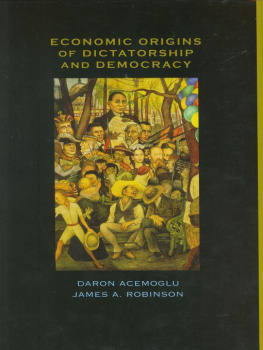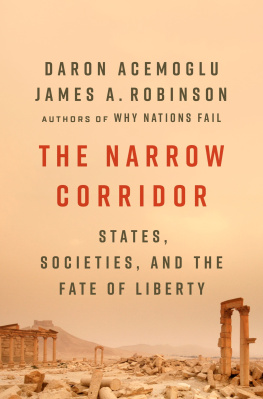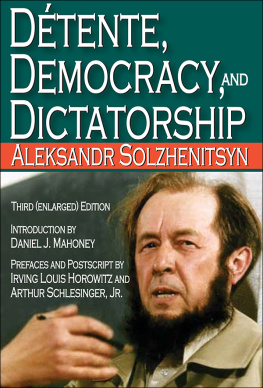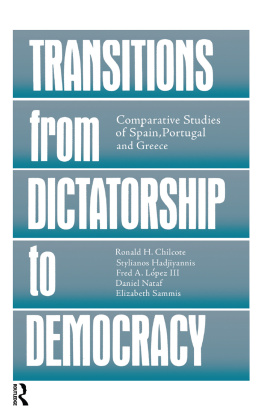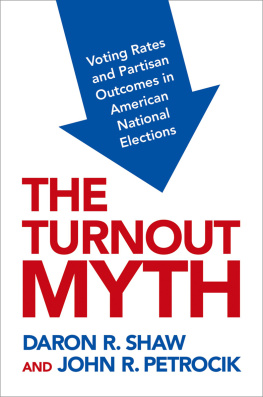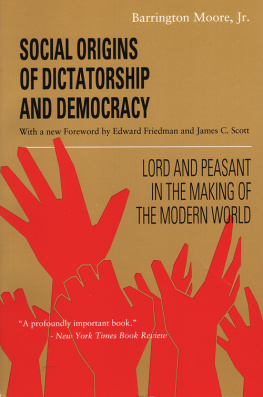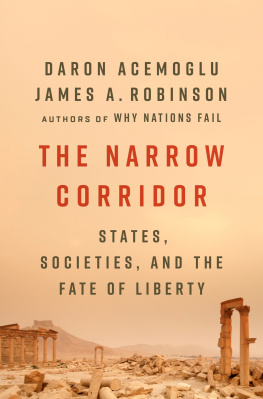Acemoglu Daron - Economic Origins of Dictatorship and Democracy
Here you can read online Acemoglu Daron - Economic Origins of Dictatorship and Democracy full text of the book (entire story) in english for free. Download pdf and epub, get meaning, cover and reviews about this ebook. City: Johanneshov, year: 2009;2005, publisher: Cambridge University Press - A, genre: Politics. Description of the work, (preface) as well as reviews are available. Best literature library LitArk.com created for fans of good reading and offers a wide selection of genres:
Romance novel
Science fiction
Adventure
Detective
Science
History
Home and family
Prose
Art
Politics
Computer
Non-fiction
Religion
Business
Children
Humor
Choose a favorite category and find really read worthwhile books. Enjoy immersion in the world of imagination, feel the emotions of the characters or learn something new for yourself, make an fascinating discovery.
- Book:Economic Origins of Dictatorship and Democracy
- Author:
- Publisher:Cambridge University Press - A
- Genre:
- Year:2009;2005
- City:Johanneshov
- Rating:4 / 5
- Favourites:Add to favourites
- Your mark:
- 80
- 1
- 2
- 3
- 4
- 5
Economic Origins of Dictatorship and Democracy: summary, description and annotation
We offer to read an annotation, description, summary or preface (depends on what the author of the book "Economic Origins of Dictatorship and Democracy" wrote himself). If you haven't found the necessary information about the book — write in the comments, we will try to find it.
Economic Origins of Dictatorship and Democracy — read online for free the complete book (whole text) full work
Below is the text of the book, divided by pages. System saving the place of the last page read, allows you to conveniently read the book "Economic Origins of Dictatorship and Democracy" online for free, without having to search again every time where you left off. Put a bookmark, and you can go to the page where you finished reading at any time.
Font size:
Interval:
Bookmark:
Table of Contents
ECONOMIC ORIGINS OF DICTATORSHIP AND DEMOCRACY
This book develops a framework for analyzing the creation and consolidation of democracy. Different social groups prefer different political institutions because of the way they allocate political power and resources. Thus, democracy is preferred by the majority of citizens but opposed by elites. Dictatorship, nevertheless, is not stable when citizens can threaten social disorder and revolution. In response, when the costs of repression are sufficiently high and promises of concessions are not credible, elites may be forced to create democracy. By democratizing, elites credibily transfer political power to the citizens, ensuring social stability. Democracy consolidates when elites do not have a strong incentive to overthrow it. These processes depend on (1) the strength of civil society, (2) the structure of political institutions, (3) the nature of political and economic crises, (4) the level of economic inequality, (5) the structure of the economy, and (6) the form and extent of globalization.
Daron Acemoglu is Charles P. Kindleberger Professor of Applied Economics in the Department of Economics at the Massachusetts Institute of Technology and a member of the Economic Growth Program of the Canadian Institute for Advanced Research. He is also affiliated with the National Bureau of Economic Research, Center for Economic Performance, and Centre for Economic Policy Research and is a Fellow of the European Economic Association. Professor Acemoglu previously taught at the London School of Economics. He received the award for best paper published in the Economic Journal in 1996 for his paper Consumer Confidence and Rational Expectations : Are Agents Beliefs Consistent with the Theory?, the inaugural T. W. Shultz Prize at the University of Chicago in 2004, and the inaugural Sherwin Rosen Award for outstanding contribution to labor economics in 2004. Professor Acemoglu is editor of the eminent journal Review of Economics and Statistics and associate editor of the Journal of Economic Growth. He is the recipient of the 2005 John Bates Clark Medal from the American Economic Association, awarded to the most outstanding economist working in the United States under age 40.
James A. Robinson is Professor of Government at Harvard University. He previously taught at the University of California, Berkeley, the University of Southern California, and the University of Melbourne. He is a member of the Economic Growth Program of the Canadian Institute for Advanced Research and affiliated with the Centre for Economic Policy Research. A 2002 Carnegie Scholar and a 1999-2000 Hoover Institution Fellow, his research has been published in leading journals such as the Quarterly Journal of Economics, American Economic Review, American Political Science Review, and Journal of Economic Literature. Professor Robinson is on the editorial board of World Politics. Together with Professors Daron Acemoglu and Simon Johnson, Professor Robinson is coauthor of the forthcoming book, The Institutional Roots of Prosperity.

CAMBRIDGE UNIVERSITY PRESS
Cambridge, New York, Melbourne, Madrid, Cape Town, Singapore, Sao Paulo
Cambridge University Press
40 West 20th Street, New York, NY 10011-4211, USA
www.cambridge.org
Information on this title: www.cambridge.org/9780521855266
Daron Acemoglu and James A. Robinson 2006
This publication is in copyright. Subject to statutory exception and to the provisions of relevant collective licensing agreements, no reproduction of any part may take place without the written permission of Cambridge University Press.
First published 2006
Printed in the United States of America
A catalog record for this publication is available from the British Library.
Library of Congress Cataloging in Publication Data
Acemoglu, Daron.
Economic origins of dictatorship and democracy / Daron Acemoglu, James A. Robinson.
p. cm.
Includes bibliographical references and index.
ISBN-13: 978-0-521-85526-6 (hardback)
ISBN-10: 0-521-85526-8 (hardback)
1. Democracy-Economic aspects. 2. Democratization. 3. Equality.
4. Political culture. 5. Dictatorship. 6. Comparative government.
I. Robinson, James A., 1960- II. Title.
JC423.A248 2005
321.8 - dc22 2005011262
ISBN-13 978-0-521-85526-6 hardback
ISBN-10 0-521-85526-8 hardback
Cambridge University Press has no responsibility for
the persistence or accuracy of URLs for external or
third-party Internet Web sites referred to in this publication
and does not guarantee that any content on such
Web sites is, or will remain, accurate or appropriate.
To the memory of my parents, Kevork and Irma, who invested so much in me. To my love, Asu, who has been my inspiration and companion throughout.
Daron Acemoglu
To the memory of my mother, from whom I inherited my passion for books and my indignation at the injustices of this life. To the memory of my father, from whom I inherited my fascination for science and my curiosity about this extraordinary world.
James A. Robinson
Preface
A fundamental question in political science and political economy is which factors determine the institutions of collective decision making (i.e., the political institutions). In tackling this question, a natural initial distinction is between democratic and nondemocratic institutions. Why is it that some countries are democracies, where there are regular and free elections and politicians are accountable to citizens, whereas other countries are not?
There are a number of salient empirical patterns and puzzles relevant to answering this question. For instance, while the United States moved very early toward universal white male suffrage, which was attained by the early 1820s by northern and western states and by the late 1840s for all states in the Union, such a pattern was not universal in the Americas. Elsewhere, republican institutions with regular elections were the norm after countries gained independence from colonial powers such as Spain and Portugal, but suffrage restrictions and electoral corruption were much more important. The first Latin American countries to implement effective, relatively noncorrupt universal male suffrage were Argentina and Uruguay in 1912 and 1919, respectively, but others, such as El Salvador and Paraguay, did not do so until the 1990s - almost a century and a half after the United States.
Not only is there great variation in the timing of democratization, there also are significant qualitative differences in the form that political development took. Democracy was created, at least for white males, with relatively little conflict in the United States and some Latin America countries, such as Costa Rica. In other places, however, democracy was often strenuously opposed and political elites instead engaged in mass repression to avoid having to share political power. In some cases, such as El Salvador, repression was ultimately abandoned and elites conceded democracy. In others, such as Cuba and Nicaragua, elites fought to the bitter end and were swept away by revolutions.
Once created, democracy does not necessarily consolidate. Although the United States experienced a gradual movement toward democracy with no reverses, a pattern shared by many Western European countries such as Britain and Sweden, democracy in other countries fell to coups. Argentina is perhaps the most extreme example of this: the political regime switched backwards and forwards between democracy and nondemocracy throughout most of the twentieth century.
What determines whether a country is a democracy? Which factors can explain the patterns of democratization we observe? Why did the United States attain universal male suffrage more than a century before many Latin American countries? Why, once created, did democracy persist and consolidate in some countries, such as Britain, Sweden, and the United States, and collapse in others, such as Argentina, Brazil, and Chile?
Next pageFont size:
Interval:
Bookmark:
Similar books «Economic Origins of Dictatorship and Democracy»
Look at similar books to Economic Origins of Dictatorship and Democracy. We have selected literature similar in name and meaning in the hope of providing readers with more options to find new, interesting, not yet read works.
Discussion, reviews of the book Economic Origins of Dictatorship and Democracy and just readers' own opinions. Leave your comments, write what you think about the work, its meaning or the main characters. Specify what exactly you liked and what you didn't like, and why you think so.

